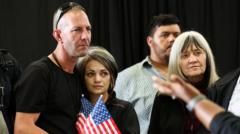The arrival of a group of 59 white South Africans in the United States under President Trump's expedited refugee plan has sparked significant controversy. Critics, including the South African government, argue that the group does not face the persecution that would qualify them for refuge, as the administration's policies have left many others, particularly from war-torn regions, in limbo.
Controversy Surrounds Refugee Status for Afrikaners as Group Arrives in the US

Controversy Surrounds Refugee Status for Afrikaners as Group Arrives in the US
A plane carrying 59 white South Africans seeking refugee status arrived in the US, stirring debate over the Trump administration's policies on race and immigration.
A group of 59 white South Africans recently arrived in the United States, anticipated to be granted accelerated refugee status under a controversial policy stemming from the Trump administration. The president has argued that the Afrikaner minority in South Africa is at risk of "racial discrimination," a view that has drawn substantial criticism both domestically and internationally.
Upon their arrival at Dulles Airport, the newcomers were greeted warmly by U.S. officials, with some waving small American flags and carrying young children. The South African government, however, has contested the characterization of their situation, stating that there is no valid basis for claiming refugee status based on persecution.
Human Rights Watch has labelled this refugee plan as a "cruel racial twist," highlighting the disparities faced by other displaced individuals, including black refugees and those from war-torn regions who have had their asylum applications stalled or denied.
The group’s expedited processing stands in stark contrast to the lengthy procedures typically involved in U.S. refugee admissions. The United Nations refugee agency, UNHCR, confirmed it was not consulted in the vetting process, raising questions about the fairness of this preferential treatment.
President Trump, addressing the situation, claimed a "genocide" was occurring against white farmers in South Africa, a narrative disputed by South African President Cyril Ramaphosa. Ramaphosa emphasized that refugees should typically leave their countries due to fear of political, religious, or economic persecution, neither of which apply to the Afrikaners in this case.
The historical context of land reform in post-apartheid South Africa further complicates the perception of the refugee situation. Although policies recognize the need for equitable land distribution, the slow pace of reform has incited frustration. As black South Africans currently hold only a small percentage of land despite constituting the majority of the population, this issue remains contentious.
Significant reactions have emerged from U.S. lawmakers and organizations. Gregory Meeks, a Democratic representative, accused the Trump administration of a politically motivated distortion of history, while the Episcopal Church has ceased collaborating with the government on refugee matters due to what they perceive as preferential treatment for the group.
The arrival of the Afrikaners marks a notable moment in U.S.-South African relations, which have been tense since Trump's efforts began. Both nations have recently exchanged contentious remarks regarding topics ranging from land reform to critiques of South Africa's international stance against Israel.
In these times of heightened global scrutiny surrounding race and migration policies, the implications of this refugee group’s arrival extend far beyond borders, potentially reshaping discussions on immigration, race, and national identity in both nations.






















